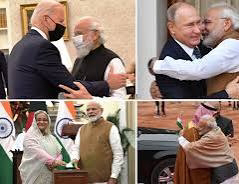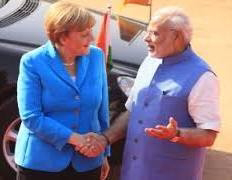Prime Minister Modi's extensive foreign policy push has seen him embark on 90 foreign trips, visiting 78 countries and accumulating 27 highest civilian honors by July 2025.
Sambalpur, July 11, 2025 – Despite an unprecedented flurry of foreign engagements by Prime Minister Narendra Modi, concerns are mounting across India regarding the true impact of these efforts on the nation's standing and its domestic well-being. A blunt statement by Deben Patel, renowned journalist of Sambalpur Odisha resonates with a growing sentiment: "No matter how much foreign policy you show, the house will sink and water will start choking."
Prime Minister Modi's extensive foreign policy push has seen him embark on 90 foreign trips, visiting 78 countries and accumulating 27 highest civilian honors by July 2025. These visits, often met with enthusiastic welcomes from the Indian diaspora and host nations, were touted as cornerstones of India's "changing foreign policy," promising to elevate its global image and solidify its position as a world leader. A significant portion of development funds was reportedly diverted to finance these highly publicized tours.
However, a closer examination of the "results" paints a less rosy picture. Far from fostering enhanced ties, India's relations with its immediate neighbors – Nepal, Bhutan, China, Pakistan, Sri Lanka, Iraq, Afghanistan, Bangladesh, and Myanmar – are described as strained, with open hostility characterizing many. Even traditional ally Russia's silence during the recent "Operation Sindoor" has raised eyebrows, contrasting sharply with the publicized camaraderie between Prime Minister Modi and the US President.
The aftermath of "Operation Sindoor" has, according to critics, laid bare the vulnerabilities of India's foreign policy. While India asserted its actions were justified, Pakistan's recent election as President of the United Nations Security Council with overwhelming support, including from the US and other nations, alongside securing an IMF loan, has been seen as a diplomatic setback for India. Pakistan, previously grey-listed and accused of promoting terrorism by India, appears to have leveraged its diplomatic prowess to gain significant international backing, particularly from China and the United States.
Critics argue that the heavy emphasis on foreign visits has come at the cost of crucial domestic development and unresolved internal disputes. Discontent is reportedly simmering among India's vast farming community, comprising 80% of the population, due to an inability to secure livelihoods. The Modi government faces widespread criticism for policies perceived to favor large corporations like Ambani and Adani, particularly regarding contract farming and grain hoarding, a factor some attribute to recent electoral losses for the BJP.
The effectiveness of border management also remains a pressing concern, with continued infiltration from Pakistan and Bangladesh. Furthermore, India's own refugees are reportedly stranded abroad, a consequence attributed to a "weak foreign policy." The appointment of External Affairs Minister Jaishankar, described by some as a "failed administrator," has fueled skepticism about the long-term efficacy of India's foreign policy vision.
Concerns extend to critical domestic sectors. The state of public sector undertakings like BSNL, contrasting sharply with the success of private players like Jio (which reportedly leverages BSNL's infrastructure), highlights a perceived failure in modernizing vital services. Questions are being raised about the lack of progress in implementing new technologies to prevent rail accidents, despite earlier assurances.
The sentiment among a section of observers is that true foreign policy strength emanates from robust internal development. The stark transformation of China over the past three decades, now directly challenging the US, is cited as a prime example. The increasing concentration of 40% of the nation's wealth in the hands of 1% of the population, while contributing to GDP growth, is seen as a sign of unequal development that undermines the nation's overall progress and internal stability.
As India navigates a complex geopolitical landscape, the current narrative suggests a growing chasm between ambitious global aspirations and the pressing realities of domestic challenges. The coming months will undoubtedly test the resilience of India's foreign policy and its ability to address the "choking" water within its own house.












0 Comments